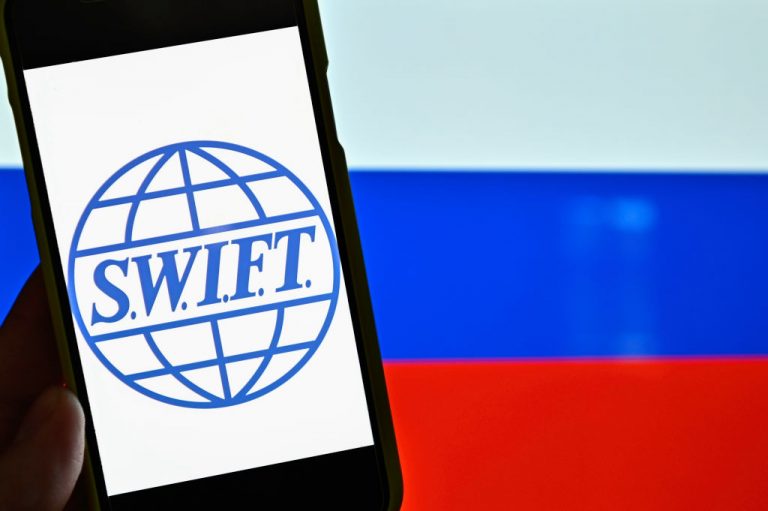As Russia’s war with Ukraine wages on, many parts of the world have launched financial sanctions against Moscow. SWIFT, the financial messaging system, has banned Russia from making business transactions. However, critics say the financial blocks may not be effective.
Sanctions against Russia
As of Thursday, Mar. 3, following its invasion of Ukraine, Russia has been hit with financial sanctions from multiple countries across the world, including the U.S., UK, and other European Union (EU) nations.
READ MORE:
- Trudeau’s Ban on Russian Oil Imports Will Have Little Effect
- NYPD Pension Fund Targets Putin, Plans to Divest Over $42M in Russian Financial Assets
- Putin Facing a Mountain of Crippling Sanctions Following Invasion of Ukraine
- German Chancellor Suspends Nord Stream 2 Pipeline After Putin Recognizes Renegade Ukrainian Territories
Russian individuals, such as President Vladimir Putin himself, and Russian banks and organizations have been targeted for the sanctions, cutting off access to foreign currency.
Citizens of the U.S., UK, and EU are prohibited from conducting business with Russian financial figures, including the Russian Central Bank. Travel has been restricted to Russians, even the wealthiest members of society.
Success
You are now signed up for our newsletter
Success
Check your email to complete sign up
The UK executed “the largest and most severe” sanctions on Russia, Prime Minister Boris Johnson said.
Dual-use goods from the U.S. have also been given “strict export controls” that President Joe Biden believes will hinder Russian military and aerospace industries.
Germany blocked the approval of Russia’s Nord Stream 2 gas pipeline’s construction inside Germany. Russian media outlets have also been banned across the EU.
Several countries, including Canada, Japan, New Zealand, and Australia, followed suit with similar sanctions on key Russian figures and organizations. Even South Korea and Singapore have also sanctioned Russia, banning exports and enacting “financial measures.”
In addition to international sanctions, Russia is also banned from using SWIFT, the financial messaging system that initiates international payments and transactions.
Introduced in 1973, the Belgian-based messaging system called the “Society for Worldwide Interbank Financial Telecommunication” (SWIFT) allows international payments and trade to be done “smoothly.” It helps banks from different countries connect with each other.
With tightly secured messages, banks can perform transactions swiftly and efficiently, placing SWIFT as a “principal mechanism” to fuel international trade.
After Russia invaded Ukraine, SWIFT removed Russia from its list of nations, complying with the sanctions of the EU, the U.S, France, Germany, Italy, Canada, and the UK.
“We will always comply with applicable sanctions laws,” SWIFT said on Tuesday.
“We are engaging with these authorities to understand which entities will be subject to these new measures and will disconnect them once we receive legal instruction to do so.”
The Council of EU states is expected to release a list of the banks affected by the ban. It has not replied for comment.
Russia is a primary consumer of manufactured goods, and exporters are expected to face riskier ventures when sending their goods to the country. For buyers of Russian goods, especially oil and gas which the EU is dependent on, they will be encouraged to search elsewhere.
The sanctions would also force exporters to rely on the domestic market while the Russian Central Bank doubles its interest rates.
Effective or not?
Despite the hope to penalize Russia, the sanctions and SWIFT ban may not be effective.
According to NPR, the Russian ruble has fallen to less than 1 cent with the rise of interest rates, bringing fears of a “breakdown in electronic banking.”
The interest rate in the Russian Central Bank is said to have soared to 20 percent after the freezing of assets by the U.S. and its allies. In addition to Moscow’s own bans of foreign transactions, the citizens of the country may suffer from “short supplies.”
Stocks also fell hard as the cost of oil now reaches past $110 per barrel, as reported by The Star. Japan’s Nikkei stocks dropped 1.68 percent, while Euro Stoxx and German DAX futures fell 0.13 percent and 0.17 percent, respectively.
Moreover, Russia would also be leaning towards China for economic aid. Beijing has its own equivalent to SWIFT, the Cross-Border Interbank Payment System (CIPS), which has connections with several Chinese and overseas banks.
READ MORE:
- In the Face of War, Does China Still Consider Russia an Ally?
- Xi Tells Putin to Resolve Ukraine Conflict Via ‘Negotiation’, Lifts All Restrictions on Russian Wheat
- Russia and China Looking to Strengthen Ties But Remain Shy of Mutual Military Support
Although it’s smaller than SWIFT, CIPS is still believed to help boost the economy for both China and Russia by boosting the “internationalization” of the Chinese yuan.
A Chinese think tank close to the Chinese Communist Party (CCP) also believes that the sanctions on Russia will “backfire” as Beijing plans to assist Moscow in its funding problems.
JPMorgan CEO Jamie Dimon also explained to Bloomberg TV that the sanctions could backfire. He said that while companies cannot use SWIFT to do business, they can still find a way to do business with Russian entities.
















